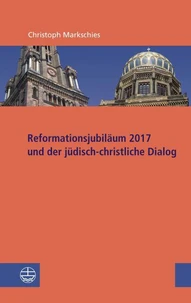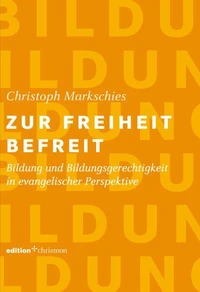Kirchenhistoriker als Herausgeber der "Theologischen Literaturzeitung". Überlegungen zu Geschichte, Gegenwart und Zukunft einer Rezensionszeitschrift
Par :Formats :
Disponible dans votre compte client Decitre ou Furet du Nord dès validation de votre commande. Le format PDF est :
- Compatible avec une lecture sur My Vivlio (smartphone, tablette, ordinateur)
- Compatible avec une lecture sur liseuses Vivlio
- Pour les liseuses autres que Vivlio, vous devez utiliser le logiciel Adobe Digital Edition. Non compatible avec la lecture sur les liseuses Kindle, Remarkable et Sony
 , qui est-ce ?
, qui est-ce ?Notre partenaire de plateforme de lecture numérique où vous retrouverez l'ensemble de vos ebooks gratuitement
Pour en savoir plus sur nos ebooks, consultez notre aide en ligne ici
- Nombre de pages180
- FormatPDF
- ISBN978-3-374-06800-5
- EAN9783374068005
- Date de parution01/05/2021
- Protection num.Digital Watermarking
- Taille2 Mo
- Infos supplémentairespdf
- ÉditeurEvangelische Verlagsanstalt
Résumé
Anlässlich der Übernahme der Herausgeberschaft der "Theologischen Literaturzeitung" zeigt der als Kirchenhistoriker tätige Autor, wie seine im selben Fach wirkenden Vorgänger Adolf Harnack, Emanuel Hirsch, Hans-Georg Opitz, Hans Lietzmann und Kurt Aland ihre Herausgeberschaft verstanden haben. Anhand bisher unveröffentlichter und teilweise bislang auch unbekannter Quellen wird sichtbar, welche inhaltlichen Akzente gesetzt wurden und wie die alltägliche Praxis funktionierte.
Auf diese Weise werden inhaltliche Neuakzentuierungen im politisch wie theologisch äußerst bewegten 20.
Jahrhundert ebenso deutlich wie die organisatorischen Veränderungen. Weil daraus auch Grundsätzliches im Blick auf eine Rezensionszeitschrift deutlich wird, lag es nahe, abschließend auch Überlegungen zur Zukunft der "ThLZ" im digitalen Zeitalter anzufügen. Die wichtigsten Quellentexte sind in einer Edition beigefügt. [Church Historians as Editors of the "Theologischen Literaturzeitung". Reflections on the History, Present and Future of a Review Journal] On the occasion of the assumption of the editorship of the "Theologische Literaturzeitung" the author, who is active as a church historian, shows how his predecessors Adolf Harnack, Emanuel Hirsch, Hans-Georg Opitz, Hans Lietzmann, and Kurt Aland, who worked in the same field, understood their editorship.
Drawing on hitherto unpublished and, in some cases, previously unknown sources, it becomes evident which thematic accents were set and how everyday practice functioned. In this way, new accentuations of content in the politically and theologically extremely eventful 20th century become as clear as the organizational changes. Since this also reveals fundamental aspects of a review journal, it was a logical step to conclude by adding considerations about the future of the ThLZ in the digital age.
The most important source texts are enclosed in an edition.
Jahrhundert ebenso deutlich wie die organisatorischen Veränderungen. Weil daraus auch Grundsätzliches im Blick auf eine Rezensionszeitschrift deutlich wird, lag es nahe, abschließend auch Überlegungen zur Zukunft der "ThLZ" im digitalen Zeitalter anzufügen. Die wichtigsten Quellentexte sind in einer Edition beigefügt. [Church Historians as Editors of the "Theologischen Literaturzeitung". Reflections on the History, Present and Future of a Review Journal] On the occasion of the assumption of the editorship of the "Theologische Literaturzeitung" the author, who is active as a church historian, shows how his predecessors Adolf Harnack, Emanuel Hirsch, Hans-Georg Opitz, Hans Lietzmann, and Kurt Aland, who worked in the same field, understood their editorship.
Drawing on hitherto unpublished and, in some cases, previously unknown sources, it becomes evident which thematic accents were set and how everyday practice functioned. In this way, new accentuations of content in the politically and theologically extremely eventful 20th century become as clear as the organizational changes. Since this also reveals fundamental aspects of a review journal, it was a logical step to conclude by adding considerations about the future of the ThLZ in the digital age.
The most important source texts are enclosed in an edition.
Anlässlich der Übernahme der Herausgeberschaft der "Theologischen Literaturzeitung" zeigt der als Kirchenhistoriker tätige Autor, wie seine im selben Fach wirkenden Vorgänger Adolf Harnack, Emanuel Hirsch, Hans-Georg Opitz, Hans Lietzmann und Kurt Aland ihre Herausgeberschaft verstanden haben. Anhand bisher unveröffentlichter und teilweise bislang auch unbekannter Quellen wird sichtbar, welche inhaltlichen Akzente gesetzt wurden und wie die alltägliche Praxis funktionierte.
Auf diese Weise werden inhaltliche Neuakzentuierungen im politisch wie theologisch äußerst bewegten 20.
Jahrhundert ebenso deutlich wie die organisatorischen Veränderungen. Weil daraus auch Grundsätzliches im Blick auf eine Rezensionszeitschrift deutlich wird, lag es nahe, abschließend auch Überlegungen zur Zukunft der "ThLZ" im digitalen Zeitalter anzufügen. Die wichtigsten Quellentexte sind in einer Edition beigefügt. [Church Historians as Editors of the "Theologischen Literaturzeitung". Reflections on the History, Present and Future of a Review Journal] On the occasion of the assumption of the editorship of the "Theologische Literaturzeitung" the author, who is active as a church historian, shows how his predecessors Adolf Harnack, Emanuel Hirsch, Hans-Georg Opitz, Hans Lietzmann, and Kurt Aland, who worked in the same field, understood their editorship.
Drawing on hitherto unpublished and, in some cases, previously unknown sources, it becomes evident which thematic accents were set and how everyday practice functioned. In this way, new accentuations of content in the politically and theologically extremely eventful 20th century become as clear as the organizational changes. Since this also reveals fundamental aspects of a review journal, it was a logical step to conclude by adding considerations about the future of the ThLZ in the digital age.
The most important source texts are enclosed in an edition.
Jahrhundert ebenso deutlich wie die organisatorischen Veränderungen. Weil daraus auch Grundsätzliches im Blick auf eine Rezensionszeitschrift deutlich wird, lag es nahe, abschließend auch Überlegungen zur Zukunft der "ThLZ" im digitalen Zeitalter anzufügen. Die wichtigsten Quellentexte sind in einer Edition beigefügt. [Church Historians as Editors of the "Theologischen Literaturzeitung". Reflections on the History, Present and Future of a Review Journal] On the occasion of the assumption of the editorship of the "Theologische Literaturzeitung" the author, who is active as a church historian, shows how his predecessors Adolf Harnack, Emanuel Hirsch, Hans-Georg Opitz, Hans Lietzmann, and Kurt Aland, who worked in the same field, understood their editorship.
Drawing on hitherto unpublished and, in some cases, previously unknown sources, it becomes evident which thematic accents were set and how everyday practice functioned. In this way, new accentuations of content in the politically and theologically extremely eventful 20th century become as clear as the organizational changes. Since this also reveals fundamental aspects of a review journal, it was a logical step to conclude by adding considerations about the future of the ThLZ in the digital age.
The most important source texts are enclosed in an edition.




